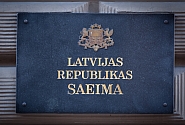
From now on, banks registered in Latvia will be prohibited to do business with shell companies and service their accounts. On Thursday, 26 April, the Saeima adopted amendments in the Law on the Prevention of Money Laundering and Terrorism Financing, banning shell companies.
According to Ministry of Finance, which drafted the legislative initiative, these amendments are aimed at eliminating money laundering through Latvia’s financial system, and the ban will apply to those financial institutions, whose client base has been dominated by shell companies and their money flow.
The ban will also apply to payment institutions, electronic money institutions, investment brokers, client portfolio management companies and open-end investment funds, which are issuing shares to investment management companies.
According to the Law on the Prevention of Money Laundering and Terrorism Financing, a shell company is an establishment having no track record of business activity, registered in jurisdictions, where financial statements are not required. Another key feature of shell companies is that they mostly have no business location.
Financial and Capital Markets Commission (FCMC) will strengthen the control of anti-money laundering and counter-financing of terrorism arrangements for financial institutions by introducing minimum due diligence requirements financial institutions will have to implement to identify companies having no actual business activity.
FCMC has concluded that weak internal control systems in banks have led to an increased money laundering risks, especially with regard to foreign clients and management of their assets. This has weakened the effectiveness of anti-money laundering efforts of Latvian banks. Due to uncontrolled flow of foreign assets, there is a medium risk that money laundering can occur, which creates a high risk of Latvian banks being used for money laundering, says the summary of the amendments.
According to FCMC, in the first quarter of 2017, the share of shell company business in Latvian banking sector reached 27.8% of total business. In financial institutions whose core business is high-risk clients, the share of shell company business was 44.52% of the total turnover.
The ban on servicing shell companies will come into effect on the day following the promulgation.
Saeima Press Service









